Be On Your Guard,
Don't Be Duped, Deceived, or Distracted: 10 Warning Signs
For Sunday November 19, 2006
Lectionary Readings (Revised Common Lectionary, Year B)
1 Samuel 1:4–20 or Daniel 12:1–3
1 Samuel 2:1–10 or Psalm 16
Hebrews 10:11–14 (15–18), 19–25
Mark 13:1–8
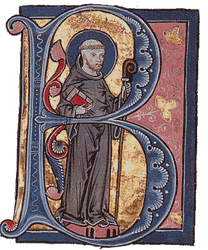 |
Bernard of Clairvaux, medieval illuminated mss. |
"They shall either be converted or wiped out," wrote St. Bernard of Clairvaux (1090–1153) of the Slavic pagans in the Baltics. It would be convenient to dismiss his chilling words as an abberation, but that would only be a comforting illusion. No, for the crusaders, genocide and forced conversions, butchery and baptisms, were equally works of God. The church not only justified and even sanctified the Crusades, it canonized them as meritorious deeds that earned one remission of sins and eternal salvation. For 500 years, from Urban II's preaching campaign in 1095–1096 to "the last crusader" Pope Pius II (1405–1464), from Greenland to Iberia and from England to Iraq, the church exterminated Nordic pagans, European Jews, Muslims in Spain and the Middle East, fellow Christians in Constantinople, and heretical Cathars in France.
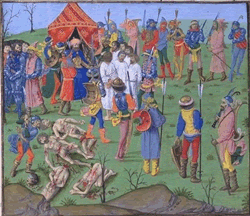 |
Holy wars. |
Long after the slaughters ended, the crusader mentality had permeated public consciousness so broadly and deeply that it expressed itself in literature, liturgy, art, architecture, and even in wills that bequeathed inheritances to fund future crusades. Thus, at the end of his thousand-page history of the Crusades called God's War, Christopher Tyerman warns of the dangers of sentimentality and naievete when it comes to religion: "It is a fond myth of the religious that piety excludes greed, coercion, conformity and lack of reflection, that it is freestanding. The language of transcendence should not distract or dupe." Tyerman's warning is as applicable today as it was in medieval Europe, and in the Gospel for this week we read how it was even true in Jesus's day and among his closest confidants.1
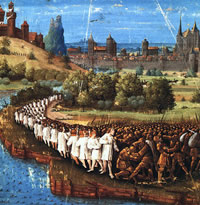 |
Crusade of 1096. |
At least four times in the Gospel for this week Jesus warns his followers: "Watch out that no one deceives you. Many will come in my name, claiming, 'I am he,' and deceive many. . . . You must be on your guard" (Mark 13:5–6, 9, 23, 33). These "false prophets and false Christs" would, if possible, deceive even his most intimate associates, said Jesus (Mark 13:22). Hints of such betrayal haunt the Gospels. Jesus's disciples jockeyed for greatness and glory. They wanted to exterminate a Samaritan village. They tried to prevent children from coming to Jesus, they outed an anonymous exorcist who was not part of their inner circle, and in the garden of Gethsemane defended him with the violence of the sword.
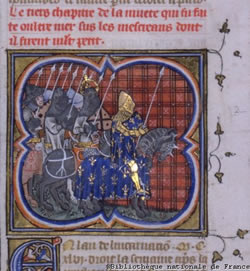 |
Louis VII departs for the Second Crusade. |
Christians not only slaughtered thousands of people in the medieval crusades. We were complicit in the Holocaust, we collaborated with the Soviet KGB, we defended slavery, and here in America have aligned the Gospel with nationalistic and political ideologies of both the conservative right (evangelicals) and the liberal left (mainline deonminations), all in the name of Jesus. Although some critics vilify Christendom as the worst of all offenders, I think history shows that religious violence knows no boundaries and plays no favorites, either with perpetrators or victims. Child sacrifice (Aztecs sacrificed 20,000 people in four days at the consecration of a temple in Mexico in 1487), widow burning, caste systems, female genital mutilation, witch hunts, ritual abuse, ethnic cleansing, suicide bombers, apartheid, and mass suicides—the list is depressingly long and as common as the morning newspaper.
Why people commit violence and evil in the name of religion might seem inexplicable. After studying the Crusades all his life Tyerman concludes that it is an "irreconcilable paradox" why medieval crusaders who followed the Prince of Peace endured unimaginable personal risks and privations in order to slaughter fellow human beings with such sincerity. Perhaps, he intimates, such violence is embedded in the contradictions of being human. But that does not mean we should ignore, excuse, or dismiss religious violence. Far from it.
At a minimum we should not remain silent when we see religious fraud. We should name it for what it is. We can all learn and reflect upon some of the signs that religion has become evil and that evil has become religious. Here are ten warning bells.
* Fanatical claims of absolute truth. I don't mean the belief in absolute truth(s), which I think is both tenable and admirable, but rather the doubt-free and uncritical confidence that one has understood absolute truth absolutely.
* Identifying the Gospel with nationalistic ideologies, partisan politics, state power, and ethnic identity.
* Blind obedience to totalitarian, charismatic, and authoritarian leaders, personality cults, or views that undermine moral integrity, personal freedom, individual responsibility, and intellectual inquiry.
* Ushering in the “end times” in the name of your religion. For a very painful illustration of these first four points, watch the film Jesus Camp.
* Justifying religious ends by dubious means.
* Any and all forms of dehumanization, from openly declaring war on your enemy, demonizing those who differ from you, construing your neighbor as an Other, to claiming that God is on your side alone. Do you believe that God loves Iraq and North Korea as much as America? There shouldn't be the slightest hesitation or qualification in the answer—He does.
* Pressure tactics of coercion, deception, and false advertisement.
* Alienation, isolation and withdrawal from family, friends and society, whether psychologically or literally (eg, David Koresh's Branch Davidians).
* Exploitation and all forms of unreasonable demands upon one's time, money, resources, family, friendships, sexuality, etc.
* Oddball, sectarian interpretations of Scripture that have little or no support from the broad, classical Christian tradition, or that disregard the best of historical-critical scholarship. The wildly successful Left Behind books (60 million copies sold) are a prime example of such Scripture-twisting.
Often these danger signs combine and overlap.
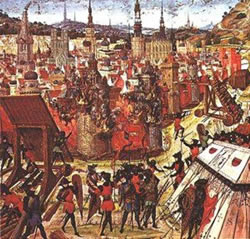 |
Capture of Jerusalem, 1099. |
There's a difference between evil committed by people who happen to be religious, and evil promoted in the name of religion. However hypocritical and heinous his secret life (but see John 8:7), Ted Haggard, former president of the National Association of Evangelicals, did not justify his actions with religion. Sometimes the connection between religion and fraud is tenuous, sometimes it is explicit. Fraudulent religion is almost always complex, multi-faceted, and bound up with other forces (social, historical, economic, cultural, ethnic, linguistic, political, etc), but at the end of the day we must admit that there is far too much hate and violence in the world that is fomented with a specifically religious rationale, motivation, or justification. Be on your guard, said Jesus, against all the many false faiths that come in his name. Don't be deceived or duped.
For further reflection
* How do you respond to charges that Christianity has fomented hatred, violence, and evil?
* Do you think that Christianity has done more evil than other religions?
* What experiences have you had with the ten warning signs above?
* Can you think of contemporary examples of these warning signs?
* See Mark Juergensmeyer, Terror in the Mind of God: The Global Rise of Religious Violence (Berkeley: University of California, 2000), which includes separate chapters on violence by Christians, Jews, Muslims, Sikhs, and Buddhists.
[1] On the last two paragraphs see Christopher Tyerman, God's War; A New History of the Crusades (Cambridge: Harvard University Press, 2006), p. 674.





